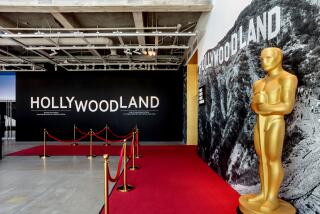Left Rabbinate to Produce Films : Philanthropist Jack Skirball Dies at 89
- Share via
Jack Skirball, who left the rabbinate to become a successful film producer and development entrepreneur and then gave away much of the fortune he accumulated from those two endeavors, is dead at age 89.
He died peacefully in his Century City home on Sunday. A funeral service will be held at 2 p.m. today at Wilshire Boulevard Temple in Los Angeles, where he and retiring Rabbi Alfred Wolf announced last month the establishment of the Skirball Institute on American Values of the American Jewish Committee.
That $250,000 endowment--to provide a forum for inter-religious dialogue on societal values--was Skirball’s last, although he gave millions of dollars to philanthropies during his lifetime.
“You have to put your money where your mouth is,” Skirball said last month in an interview that coincided with the formation of the institute named for him. That philosophy extended beyond his charities to his professional life. “I (also) never made a picture I didn’t have my own money in.”
The one-time motion picture mogul began his career on a more spiritual note. He became a rabbi. Nine years after graduating from Cincinnati’s Hebrew Union College, he decided he “wasn’t really a religious guy.” He recalled last month that he had come to participate in the faith of his family only after the death of his immigrant father. “You couldn’t get buried unless you joined a temple. I joined because my father died.”
In reality, however, he was always more intrigued by the film business. Since his undergraduate days at the University of Chicago he had sold one-and two-reel pictures for the old Metro studios. He continued that sideline after becoming a rabbi. After deciding to leave his 125-family congregation in Evansville, Ind., where he said he “was a hell of a good parson,” he devised a concept for visual education using the relatively new medium of film in schools. With the help of a financier he formed Educational Films and soon was producing more than 50 short classroom pictures a year.
Through a brother who was a sales representative for Metro, Skirball was introduced to director Frank Lloyd (famous for the 1935 “Mutiny on the Bounty”), and the two men decided to become independent producers.
Their credits in the 1940s and ‘50s included “The Howards of Virginia” starring Cary Grant, “Saboteur” and “Shadow of a Doubt” with Alfred Hitchcock, “Payment on Demand” featuring Bette Davis, “This Woman Is Mine” with Franchot Tone and many more.
“Nobody was more surprised by my success than I was,” he said of his film ventures.
He continued to produce until 1976, when he teamed Liza Minnelli and Charles Boyer in “A Matter of Time,” but he said he had never really abandoned his interest in pictures. “I’m on the eternal search for a story.”
Dabbled on Broadway
He also dabbled on Broadway, producing “Jacobowsky and the Colonel” in 1944. It took so long to put together, he remembered, that a friendly wag suggested that he retitle it “Jacobowsky and the General.”
He also began to plow his profits into developments, primarily one of the world’s most successful family resorts, the 43-acre Vacation Village in San Diego’s Mission Bay. He opened it in 1962 for an undisclosed investment and sold it in 1983 for a reported $51 million.
With those and other funds he pledged $3.5 million to help move his Skirball Museum--a collection of rare Jewish artifacts--from its location at the edge of the USC campus to Sepulveda Pass, where it will become a part of the 15-acre Cultural Center for American Jewish Life under the auspices of Hebrew Union College.
Most recently he was in the process of asking for another 1 or 2 million dollars from the administrators of his trust to endow a halfway house at Scripps Memorial Hospital in La Jolla for teen-age substance abusers.
Survived by his wife, Audrey, two daughters and a sister, Skirball was an unabashed sentimentalist about the country in which he had accumulated his millions.
“I am an American of Jewish faith,” he told The Times last month. “An American who happens to be a Jew. Nobody could feel more at home in America than I do.”
More to Read
The biggest entertainment stories
Get our big stories about Hollywood, film, television, music, arts, culture and more right in your inbox as soon as they publish.
You may occasionally receive promotional content from the Los Angeles Times.










